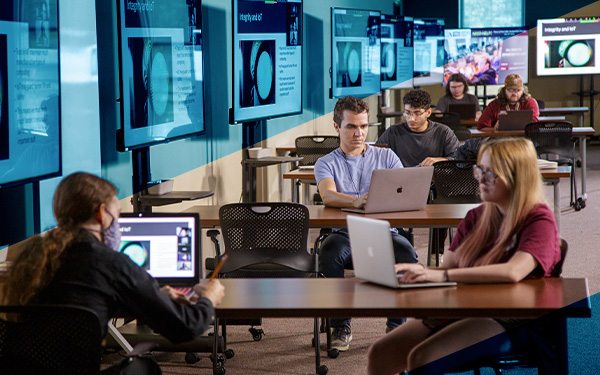UA Little Rock Online Graduate Programs Listed Among Nation’s Best by U.S. News and World Report For Third Year in a Row

The University of Arkansas at Little Rock has been recognized as having some of the best online programs in computer information technology in the country. U.S. News & World Report ranked UA Little Rock 19th in its 2022 ranking of “Best Online Graduate Computer Information Technology Programs.”
This ranking assesses online master’s degree programs in computer science, computer engineering, software engineering, information systems, and information technology. UA Little Rock also earned the 19th spot in the 2020 and 2021 lists for U.S. News & World Report.
“We are really gratified to make the list for the third year in a row. We know we need to keep improving every year to maintain our position on this very competitive list,” said Dr. Elizabeth Pierce, chair of the Department of Information Science, which houses both programs. “We take very seriously our ongoing efforts with the UA Little Rock Graduate School, our program faculty, students, and alumni to find ways to make the educational experience associated with our programs as attractive, affordable, and high quality as possible.”
At UA Little Rock, the U.S. News ranking covers the online Master of Science in information quality and Master of Science in information science programs. Both degrees serve as a stepping stone for other advanced graduate degrees, such as UA Little Rock’s Ph.D. in computer and information science.
The online master’s degree in information science is a 33-hour program designed to familiarize individuals with the advanced knowledge, skills, and technologies for working with large amounts of complex data. Students learn how to compete in an industry with an ever-present demand for new innovations in data science and analytics, advanced information systems design and development, and emerging information technologies.
“Enrollment in UA Little Rock’s Master of Science in information science has been increasing as recognition of our program grows,” said Dr. Daniel Berleant, professor of information science and coordinator of the graduate program. “We are grateful to the many people here who have been so helpful. This includes staff members as well as other academic departments and their faculty who teach the great courses that many of our students have been taking as electives. We plan to continue building on our success at bringing in new students and gaining recognition for UA Little Rock locally, nationally through the distance education option, and internationally.”
The online master’s degree in information quality is a 33-hour program that can be completed in as little as 18 months. The program is designed to prepare students for industry and government careers as well as advanced doctoral studies. Developed with support from the Massachusetts Institute of Technology Information Quality Program, the curriculum balances information quality theory with industry best practices using state-of-the-art technology.
Dr. John Talburt, professor of information science and advisor of the Master of Science in information quality program, said that UA Little Rock is seeing record enrollment in its information quality degree programs. He credits this success to quality online instruction, career preparation, and student diversity.
“Both the information quality and information science programs offer students from diverse educational backgrounds a gateway into successful careers in data science, data analytics, and data management,” Talburt said. “Many entering students with non-technical undergraduate degrees come because they have had on-the-job experience with data and technology and want to be a part of the data revolution. No specific undergraduate degree is required for admission. The program also embraces cultural and gender diversity. While this has been a problem for many computer science and engineering programs, nearly one third of our student body are women and more than half are international students.”
For the 2022 rankings edition, U.S. News evaluated schools on five categories, including engagement (25 percent), faculty credentials and training (25 percent), expert opinion (25 percent), service and technologies (12.5 percent), and student excellence (12.5 percent). A program’s score for each ranking indicator is calculated using data that the program reported to U.S. News in a statistical survey.
